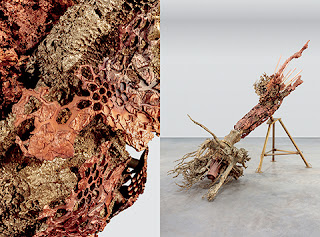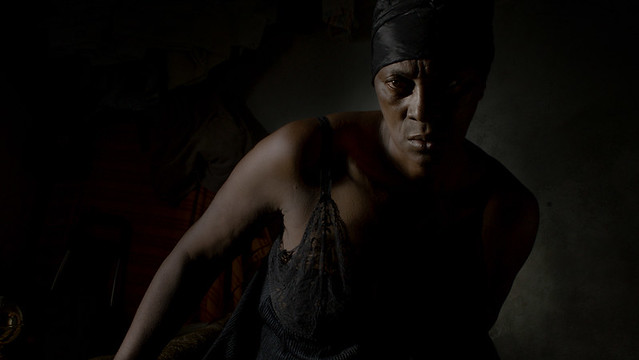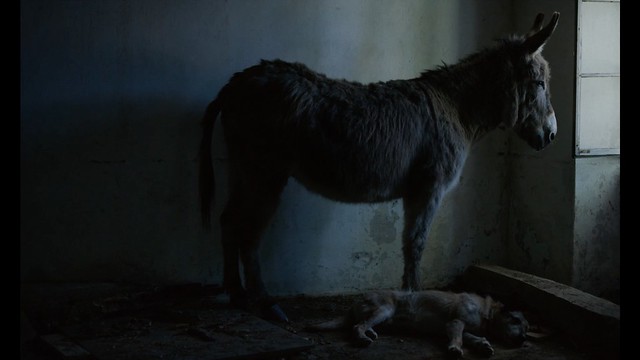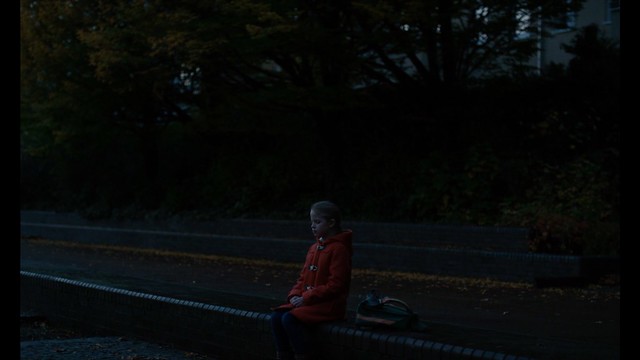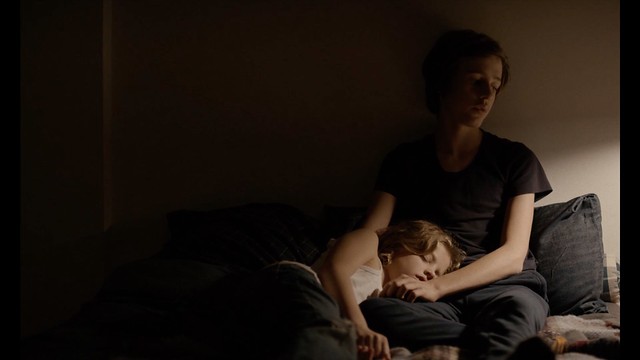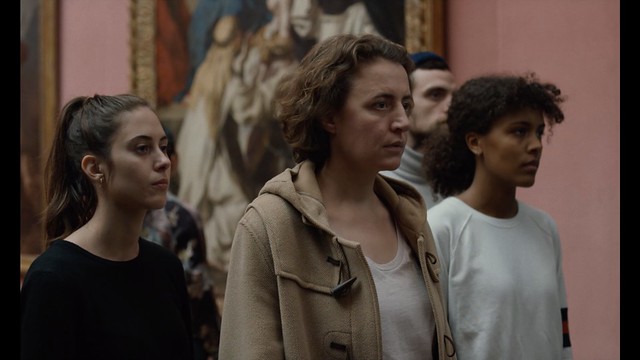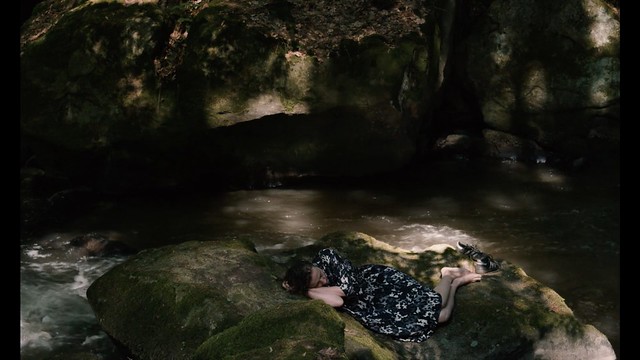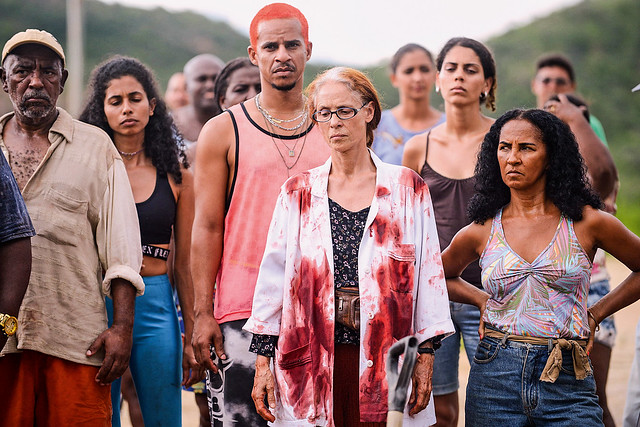
Synonyms, Nadav Lapid's semi-autobiographical film about a young Israeli man struggling with his country's identity, won him many accolades this year, including the Golden Bear at the Berlinale. The film is greatly aided by its fearless star Tom Mercier. I had a chance to sit down with Lapid when he was in town for the New York Film Festival.
It opens this weekend in selected cities in the US. Please click
here for my review of the film.
I know that your films are somewhat autobiographical. How close was the experience for you with SYNONYMS, as your main character Yael was going through in Paris?
It was pretty close. I mean, myself, I’ve done military service and a year later, I felt…in a very sudden way had a courage to leave, to runaway and never come back. It was the same determination, the same passion. And I landed in Paris and few days later…it’s very few words in French but…with not concrete plans for the future except for this…existential crisis, to die as an Israeli and reborn as a French.
I was mumbling words in adjectives and synonyms in French walking on the sidewalk you know.
Did you have a little French-Hebrew dictionary like in the movie?
Yeah yeah yeah totally! I still have it in somewhere in my pocket. (Laughs.)
Most of the scenes that takes place afterwards, I feel it’s like the real life and a movie, like me and Tom. I guess Tom is a little bit better version of myself. So I guess the movie is a better version of a real life in a sense.
You know that there is a moment in your life that looks like a genesis of a wonderful scene and then you go somewhere else or fall asleep…I don’t know. But in a movie, you can go back to these moments and, sometimes it’s opposite and sometimes it’s too evident (to the real life), so you can blur it a bit. So I think that’s the main difference.
Tom Macier is really phenomenal in this film. I hear there is a funny story behind his casting. Can you tell me about it?
I can tell you about the casting but you can decide it’s a funny story or not.
OK.
I mean, we found him in an ordinary casting but, only ordinary thing about it was the guy was like a youth judo champion. He was supposed to bring in the gold medal but the pressure and people’s expectations were too much, he abandoned judo to become a dancer. You can tell in his performance that fragility and tenderness and also violence.
Yeah.
Having him on set is like a casting a super hero, because he is capable of doing anything, I mean, physically and intellectually he can do everything. He can walk on his hands on Saint Germaine Boulevard while talking synonyms to the word 'clock'. I mean, it’s almost dangerous to have a person like this on set because whatever you are asking on set will be done.
But I realized and accept the fact that that’s how he functions. He does these things in a very calm and concentrated way. He is very serious.
And our casting director asked him to charm us because that was what was required of the character. I thought to myself, ‘oh man what’s the poor guy going to do?’ He was hesitating for a second. Then he went and found this life size cut out of a woman from behind the curtain. He started to hum and sing to her…some Edith Piaf song. He was this charged with this funny charming erotic cabaret thing.
They were rolling on the floor. It was pretty unbelievable. It was intense! He had so much imagination and inventive power. So we said. Wow that was great. And the moment we said that, he walks away and was being his serious self again. So that’s Tom. He can go from calm to racing from zero to three hundred in a second. He does that in the movie.
Oh definitely!
He can be polite and everything but he can also explode in a second.
I sat through the credit and it was backed by Israeli Ministry of Culture and Sport. But the movie itself doesn’t portray a flattering picture of Israeli military…
To say the least…
To say the least. How did it come about? How did you get a funding from them for this film?
First of all, I got the funding in 2017. I’m not so sure I would’ve gotten it today. It was slightly different. But even then, before there was kind of pitch you had to do. So before that, someone who knows me quite well, who was a director of one of those ancient film funds, called me and told me that when you do a pitch, try to make it sound a bit more patriotic. (Smiles devilishly.)
I mean, this is something that never happened to me before. But he told me, “Maybe present the movie as a story of a guy who had a post-traumatic stress disorder as a soldier with this PTSD symptoms, went to France but in the end finds out that there is no place like home, or something like that." It's true, you CAN talk about the movie like this!
There have been political movies made in Israel. And lately some of them are harshly criticized. For instance, a movie about a soldier at a checkpoint. But for the Ministry of Culture and other organizations around them, it is easier for them to deny those films’ argument and accuse them of falsehood.
But I think Synonyms goes much beyond. It talks about Israeli collective soul, Israel’s DNA, the essence of the Israeli state. This goes much beyond it becomes almost abstract. It’s not a left wing movie. At the same time, I think the movie is much more ambivalent. At the end, Yoav is as harsh to his French friends as he is to Israel.
I always feel that…when people ask me if the film is anti-Israel, I say that the main character who is desired, sensual, sexy, loved by the camera is an Israeli. An Israeli can’t be totally anti-Israel. All the contradictions exist in Yoav.
Before the premiere of the movie, one of the high officers of the Ministry of Culture who came, told me “I can’t wait to see if that movie is pro or anti Iarael.” I told him OK, the moment you find out, please tell me because I don’t know. In a way I was sincere. They don’t know how to deal with it.
I also saw Maren Ade as a executive producer and SBS Production on the credit too. How did that happen? Did you know these people previously?
No, no. But Komplizen Film and Maren Ade, they really loved my previous films and wrote to me often. I felt we had the same views in life. For Said Ben Said (SBS), I didn’t know him before. But I am pretty close to one of the most important figures in French cinema, Olivier Père. And Said was there too when I pitch the project.
But the film was not the easiest one to produce because many people didn’t like the script at all. My previous films were well received in France and they were excited about me coming to France to shoot it. But soon they read the script, they were disappointed.
I mean a lot of people loved it but I think it happens quite often with my script. The script itself is about 1/3 of the movie so when they read it they often feel it’s incomplete. It has beginning, middle and end but they feel it is incomplete.
Just like your previous film, KINDERGARTEN TEACHER.
Yeah, exactly. Exactly.
Shai Goldman, who HAS shot all your films, does an amazing job in this film. It’s so kinetic in the beginning, How did you accomplish all the POV shots of Yoav walking in the sidewalk?
I held the camera when we were shooting on the street. We shot it on a smaller camera, usually with only me and my actors. Sometimes Shai was there as well. I think it really injected an extremely important thing to the movie. This vibration into a normal life. Whenever he is not doing something he is walking. The way he walks, it tells us about his state of mind.
It was fantastic. The film is so energetic.
The flashback sequences when Yoav is in the military. He wins the silver medal. Did it really happen to you?
(Uncomfortable laugh) Yeah…. My mother started clapping and that put me to shame.
We talked about this before but it’s not only the film makes fun of Israel’s uber military culture but there is this perverted French photographer. Is this how you view the French: perverted and uncaring to the foreigners who are coming and living in French society?
Well, you know for Yoav’s character, earthly paradise is obviously France. So however grossly caricatured they are, the better.
That’s why Yoav wakes up naked in front of the Frenchest French couple. It’s in the place he chooses to go -- the most archetypal places in Paris: Notre Dame and the bridge over Seine. There is always this distant curiosity the French people have for other nations and of course they are all somehow inferior.
I find that interesting about Yoav’s friend, who is super macho and yelling at the people in the subway and they don’t really give a shit. It goes perfectly well with what you are saying.
Yeah, exactly.

